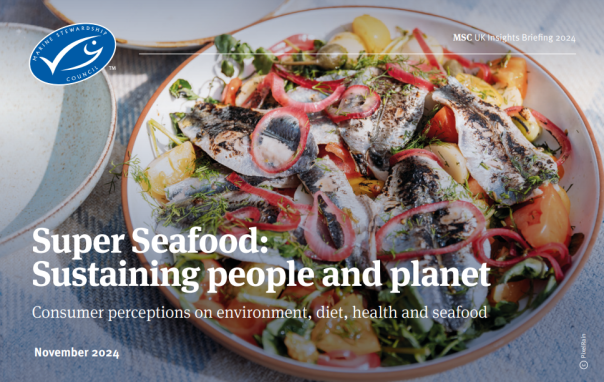
The report ‘Super Seafood: Sustaining people and planet’ found 80% of UK consumers said they had made changes to their diet within the last two years, with two thirds of those citing health as the main driver for doing so.
Just under half of UK respondents (45%) gave some kind of environmental reason for changing diets, demonstrating that concern for the planet, and ocean, is influencing dietary choices.
More than a quarter of consumers (27%) said they now eat less fish than two years ago, with 13% saying they are eating more and almost half (48%) eating the same amount.
Of those who purchased and ate seafood over half (52%) said they would eat more fish and seafood if it cost less, whilst a third (29%) said they would do so if it was produced in a way that doesn’t harm the ocean and over a quarter (26%) citing health reasons for increasing consumption.
National food campaigner Henry Dimbleby said: “Wild-caught seafood is a nutritious, affordable and sustainable source of protein. Yet, despite the NHS recommendation to eat two portions a week only 21% of Britons do. As the latest scientific data on overfishing shows, we are right to be concerned about the state of our oceans and the impact increased consumption could have on further overfishing.
“However, there is a way to meet the NHS guidelines without exacerbating the problem – by managing fish stocks sustainably, based on science and choosing to eat certified sustainable fish. Nature, when supported, can rebound and flourish. Governments, businesses, and policymakers need to act to support this – and the UK must deliver on its commitments to implementing a world-leading approach to sustainable fishing.”
The report concludes that, while seafood is an important source of nutrition, if Governments are to deliver positive health outcomes through increased fish consumption, support for progressing sustainable fishing needs to be prioritised.
Choosing MSC certified sustainable seafood ensures that stocks are well-managed, and environmental impacts limited. The MSC estimates that by managing global fish stocks sustainably and eliminating overfishing, we could be meeting the nutritional needs of an additional 72 million people annually.
George Clark, programme director for UK and Ireland at the MSC, added: “While our report reveals there is a public willingness to change consumption habits and choose more sustainable fish and seafood, to both help the environment and maintain a healthy diet, individual responsibility can only go so far.
“There is a fantastic opportunity here to really get behind UK fishing communities and others around the globe in meeting the environmental and health expectations of consumers. Governments, businesses and industry must work together to raise the profile and grow the supply of healthy, sustainable, wild-caught fish and seafood, for consumers today and in the future.
“Fish and seafood must be caught sustainably to meet the nutritional and health needs of the nation without risking further overfishing. Through collaboration and programmes like the MSC’s, we can ensure there’s more fish on our plates for generations to come.”
The report makes four key recommendations:
- Food industry leaders and the UK Government should take a holistic approach to dietary recommendations that include sustainability considerations
- The UK fishing industry should be enabled and empowered in the drive towards sustainability
- Direct engagement with consumers should be increased and the delivery of a sustainable UK fish and seafood industry prioritised
- Government must deliver a world-leading approach to sustainable fishing